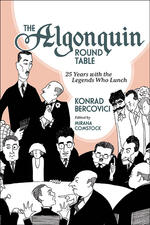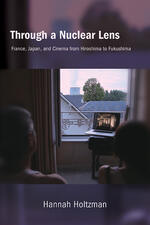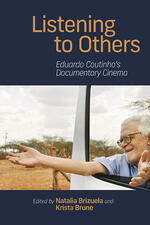
New This Month in Film, Visual Culture, and Performing Arts - May 2024
The Algonquin Round Table: 25 Years with the Legends Who Lunch, by Konrad Bercovici and edited by Mirana Comstock, tells the facts and legends of New York's famed artistic hub told by one of its key participants.
"Konrad Bercovici was a writer of great gusto. A world traveler who enriched his writing talent in the tradition of the determined journeyman of life." — New York Times
"I have met a number of great men and Konrad was, of course, a great man, but never did I meet such a rare man. He was rare in the extraordinary accumulation of knowledge in so many variegated fields of life that it stunned the imagination to contemplate it. We all sat at his feet to learn and marvel … If I have to count the blessings of my life, high upon the list, if not indeed first, would be the privilege of being with him for perhaps a quarter of a century at daily luncheons." — Louis Nizer, author of My Life in Court
"…[Bercovici] wrote on sociological questions from the vantage of an educated man, an immigrant to one of the most complex and multicolored cities on earth—New York. The completeness with which he assimilated the flavors, forces and antecedents of his new suroundings testifies to his large capacity for social feeling." — Time Magazine
Our Horizons of Cinema series aims to publish accessible, critical, and appealing studies of the history, production, cultural reception, and social meaning of film, considered either retrospectively or with a view to future developments (or both). Subjects may include specific films, filmmakers, genres, historical eras of film production, and production processes; as well as multicultural, ethnographic, technical, and theoretical aspects of cinema.
Through a Nuclear Lens: France, Japan, and Cinema from Hiroshima to Fukushima, by Hannah Holtzman, examines the increasingly reciprocal nature of Franco-Japanese cultural exchange through films that center on nuclear issues.
"Through a Nuclear Lens connects the fields of French film studies with energy humanities, a rapidly emerging field committed to understanding and exploring how our dependence on oil and nuclear energy shapes societies and affects subjectivities and human narratives. Holtzman posits cinema's capacity to function as a critical dialogic site, where different cultural anxieties and otherwise nationally understood subjectivities can encounter one another, and where the boundaries between canonical contributions and lesser-known works disappear." — Audrey Evrard, Fordham University
"The title of this well-written and expertly organized book suggests only part of the critical and historical richness it has on offer. Holtzman masters a host of interconnected cultural issues to provide a deeply nuanced portrait of the nuclear age that usefully de-centers the Anglo-American experience." — R. Barton Palmer, editor, Quarterly Review of Film and Video
The Latin American Cinema series welcomes monographs dedicated to the study of Latin American cinema and focuses on regional clusters (such as the Andean region, the Southern Cone, Central America, or the Spanish Caribbean), and also on the analysis of the national and sub-national film traditions of the region. Publishing works on any part of the historical arc of Latin American cinema, from its earliest iterations to contemporary production. The topics address production and distribution structures; textual and formal analysis of films; audience and reception studies; theoretical approaches; historical and archival studies; and studies of key directors, films, and movements.
Listening to Others: Eduardo Coutinho's Documentary Cinema, edited by Natalia Brizuela & Krista Brune, is a collection of original essays and previously untranslated critical writings on the renowned Brazilian documentary filmmaker, Eduardo Coutinho.
"Listening to Others offers diverse engagement with the work of Eduardo Coutinho and its various ethics of open conversation between cinematic subjects. While nearly all of Coutinho's films are examined, many of the essays dialogue with one another and offer analyses of the same films from different critical angles. The result is a rich reading experience that allows for further critical engagement with Coutinho's work and with documentary cinema as a whole." — Andrew C. Rajca, author of Dissensual Subjects: Memory, Human Rights, and Postdictatorship in Argentina, Brazil, and Uruguay
Happy reading and come back to see what's new next month!




